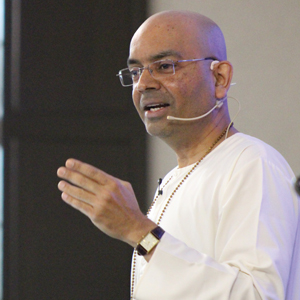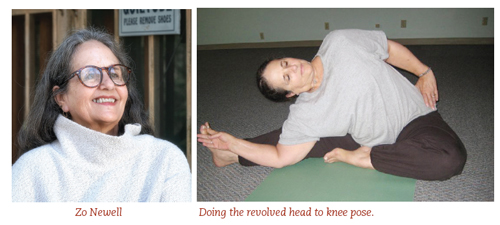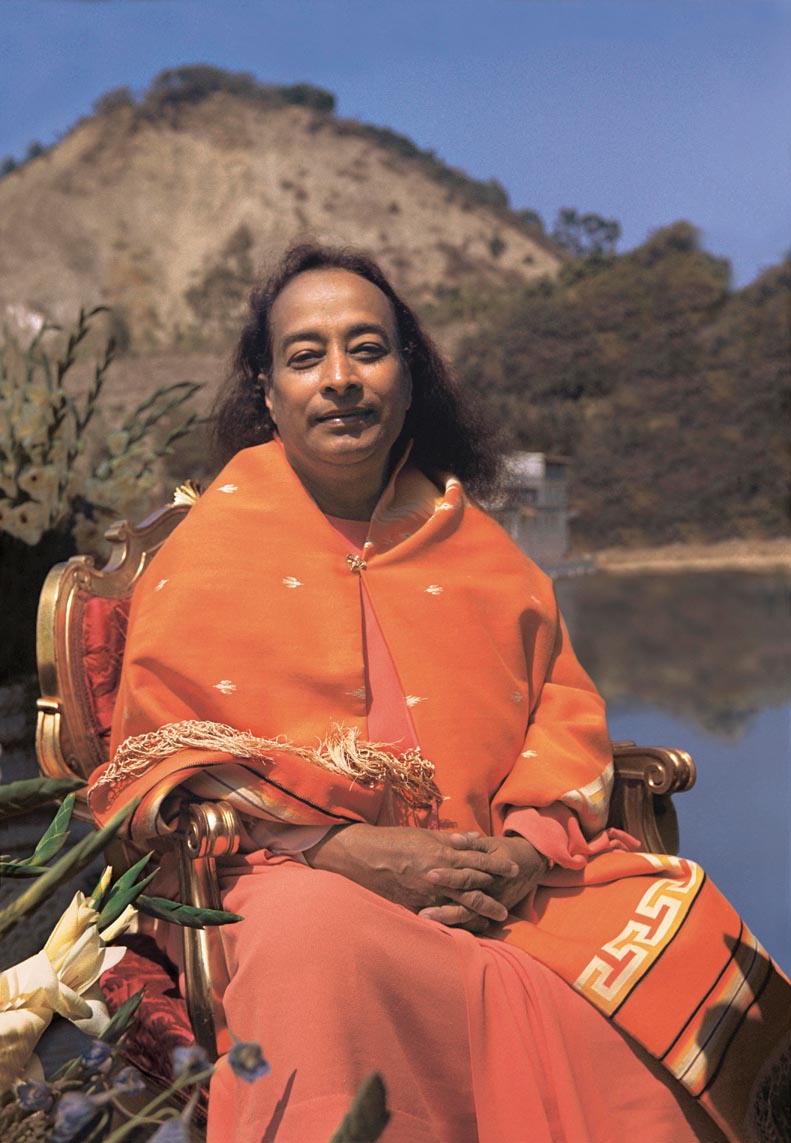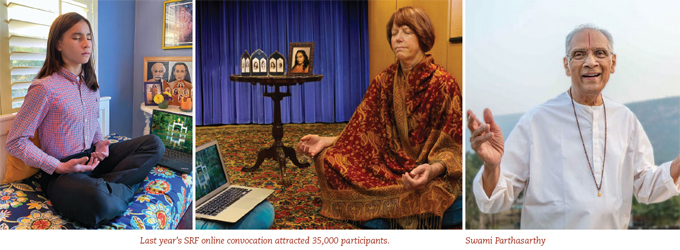Life Positive: Inward Journeys in Pandemic Times

We all have a purpose. Even to get out of bed we need a purpose—an awaited cup of coffee or the life changing presentation at work. But what happens when something stark shakes the very foundation of our purpose? When crisis strikes in my life, after the initial shock, I always turn inwards. Inside, I find the comfort of home because home is where our story begins. It is what makes us who we are. By home I do not mean the physical home, even though I do wish I could easily get on a flight to India. By home I mean those aspects of home that give comfort and solace in a time of need. For me, that comfort has come from the illuminated knowledge of Eastern philosophy.
Photos: Courtesy of Vedantausa.org, Zoe Newell, and Self-Realization Fellowship.
[Left] Gautam Jain teaches Vedanta in New York and New Jersey.
Vedanta
When the pandemic hit, I found my answer in Vedanta. Years ago, I had serendipitously found classes offered by the Vedanta Academy. The Academy is based in the Malavli hills outside Mumbai and was started by renowned Vedanta scholar Swami Parthasarathy. At 92, Swamiji has taught Vedanta for 50 years. The mission of the Academy is to spread the pure and priceless knowledge of Vedanta to all who desire it.
Gautam Jain studied at the Academy directly under Swamiji and now teaches in the New York and New Jersey area. He explains that the word Vedanta is made of two Sanskrit words—Ved (knowledge) and Anta (culmination). “Ultimate Knowledge” is another way to put it.
The unique commentary of Swami Parthasarathy throws light on the fundamental concept in Vedanta of the Intellect: “Not many people know that we have two faculties within. One is the mind (manaha) and second is the intellect (buddhi). In the modern world, the mind is out of control. Emotions gone awry create stress, chaos and greed. The faculty that can control the mind is the intellect. The systematic study of Vedanta teaches us how to use our intellect.”
The common belief in our culture is that the study of anything spiritual, including Vedanta, is not warranted before old age. If anything proves that theory wrong, it is the pandemic. People of all ages across the board have been affected by it. So how can Vedanta help? “What people have faced with the pandemic is that they can’t have their previous lifestyle. They are frustrated, stressed and overwhelmed. Stress comes when you don’t access properly. It is like expecting the weather to be warm in the middle of winter. If we apply the knowledge of Vedanta, we see that this is a once-in-a-generation type of situation. There is hope and this agitation can be controlled,” says Gautamji.
John Milton said, “The mind is a place of its own. It makes heaven out of hell and hell out of heaven.” How do we tame our minds? “Don’t we have a manual for our cars or our phones? So where is the manual for our lives? Life is an art. It is a skill that needs to be learned and Vedanta is that manual,” Gautamji adds.
The need for this knowledge has never been greater. In his own classes, Gautamji has found a big rise in participation. Where there would be 40-50 students in a class in Manhattan, now he has about 300 per class who attend via Zoom or catch up on classes on YouTube. All classes are free and have room for questions and answers. What does he foresee going forward? “A hybrid model,” he says.
Yoga

Last year, like many other women, I found myself going from full-time work and part-time motherhood to full-time work and full-time motherhood, all from home. In such busyness I was reminded of my yoga teacher, Zo Newell, who had wisely told me years ago that if you cannot do a whole practice, try doing one pose a day. Yes, I could do that, and it helped me tremendously until I built my practice back in the changed circumstances.
An author and teacher of yoga for 31 years in the U.S., Newell was introduced to yoga as a meditative discipline rather than an aerobic activity. When I studied yoga with Zo, I found that her practice honored its purity. Her years of study in Indian mythology had instilled in her an understanding of the sacredness of this discipline. We both hesitated before embracing online yoga instruction, and have been pleasantly surprised.
“I’ve always been cautious about online instruction because it can be risky for inexperienced students as the teachers cannot see and adjust them,” she notes. “But the pandemic has led to more and more experienced people teaching online and many of the classes are excellent. In fact, I have been able to take online classes with two world class teachers. I’d never have had time and money to do these in person.”
There is no doubt that yoga can help the mind and body to cope with the stresses of the pandemic. Many teachers and students in yoga are taking this time to strengthen and deepen their practice.
“Going forward I am hopeful there will be a new standards set for quality online yoga teacher’s training,” Zo says. “As students I think we may come out of this experience healthier, more even-keeled, and less competitive.”
Yoga can help combat Covid-19 by building up immunity. In this process, pranayama and active poses go hand in hand. “Most teachers I know realize how exhausted most of us are. This is not a time to do sun salutations till you drop. This is a great time to fine-tune your supported back bends and chest and shoulder openers,” she notes. Zo recommends getting to know your lungs and breathing process. This is because active poses strengthen the muscles associated with breathing and pranayama builds lung capacity as well as sensitivity to the breathing process. “We have seen people with Covid-19 lying face down to breathe; learn to activate your back lungs now and maybe you can avoid the inhaler even if you do get sick.”
Meditation
 The benefits of Eastern practices would be incomplete without the mention of meditation.
The benefits of Eastern practices would be incomplete without the mention of meditation.
The Self Realization Fellowship offers free guided mediations, study groups and lessons formulated by Paramahansa Yogananda. By divine providence, their online meditation website was created in 2019, just before the pandemic hit. The SRF convocation, usually attended by about 5,000 people, was held online in 2020 and attended by 35,000 people! Additionally, they have seen a 77 percent increase in their online guided meditation, a 500 percent increase in prayer requests and a 90 percent increase in interest in their lessons.
[Right] Swami Yogananda at the Lake Shrine dedication in 1950.
As an onlooker, I wonder how the power of group meditation translates to an online platform? Brother Ishtananda, the Minister Counsellor of the SRF Center in Atlanta, says, “The reason that the physical sanctuary is effective is because of the exchange of vibration. In meditation those who can go deep can help others who are struggling to go deeper. What is interesting though is that this phenomenon is taking place in consciousness, not in a physical space. In the online platform there are hundreds of people at any given time, and you can really sense the unity of the group meditation.”

During this time, many learned to let go of their dependence on the physical temple and this challenge allowed them to take their sadhana (spiritual training) to a deeper level without external support. Venu Pannirselvam is one such student. In spite of being a devotee since 1990, he has found that 2020 revived his practice. “The free online participation offered by SRF, including an increased access to the monastics, was a game changer for me. I dived deeper and my practice was better, possibilities increased, and limitations fell away. I also overcame health issues I was going through at the time,” he says.

[Right] Brother Ishtananda
The pandemic has the potential to turn a challenge into an opportunity. “Growth is not always pleasant and that’s what we are seeing in the world. Lord Krishna says, ‘Become anchored in that which is changeless.’ With that anchor we become less egocentric, and when we function from such a place, we can have more compassion and a desire to serve,” says Brother Ishtananda.
It is never too late to take up a practice or apply ourselves to a purpose. The teachings of Eastern thought are pearls hidden in our culture, perhaps even India’s greatest gift to humanity. “Just like the Industrial Revolution, even though it originated in the West, the entire world has benefitted from it. Similarly, spiritual knowledge, yoga and meditation originated in the East and can be used by all. My only hope is that it not be commercialized,” says Venu.
I could not agree more!
Preeti Hay is a South Carolina-based writer whose writings have appeared in publications including The Times of India, India Currents, Yoga International and anthologies of fiction and poetry. She can be reached at preetikhilnani@gmail.com. To comment on this story, please write to letters@khabar.com.
Enjoyed reading Khabar magazine? Subscribe to Khabar and get a full digital copy of this Indian-American community magazine.
blog comments powered by Disqus














